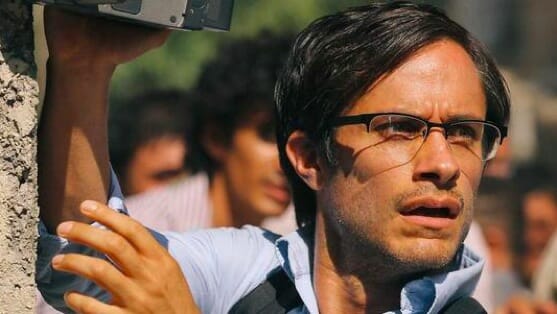Rosewater

It’s no surprise that Rosewater, Jon Stewart’s initial foray into feature filmmaking, is a political drama. The Daily Show host is a master of satire, using sardonic wit and intelligent insight to skewer governments, politicians, bureaucrats and the media during his fake news broadcast. But The Daily Show also has a certain loyal demographic that gives Stewart the freedom to test the boundaries of humor and newsiness. Rosewater is his attempt to appeal to a much larger audience, which ultimately results in a well-meaning if diluted film.
The film is based on BBC journalist Maziar Bahari’s best-selling memoir Then They Came for Me: A Family’s Story of Love, Captivity, and Survival. During Iran’s historic 2009 presidential elections, the Tehran-born Bahari (portrayed by Gael García Bernal) left his London home to secure an interview in Iran with Mir-Hossein Mousavi, the primary contender against incumbent Mahmoud Ahmadinejad. After Ahmadinejad declared victory in the race hours before the polls even closed, the broadcast journalist captured footage of street riots and general unrest, which he then transmitted to the BBC.
Because the footage painted the Iranian government in an unfavorable light, the Revolutionary Guard arrested Bahari, a Canadian citizen, and accused him of spying for the West. He was detained for 118 days and subjected to both physical and psychological torture, conducted by a man whom Bahari nicknamed “Rosewater” (played by Kim Bodnia) for his choice of scents.
While many of the film’s actors are not Iranian—Bernal is Mexican and Bodnia is Danish—the casting “controversy” is a nonissue. The actors assume their roles expertly and master the mixture of an English-Persian accent used in the film. (It also helps that most Americans are not familiar with Farsi.)
The film adapts Bahari’s experiences, its subject treated with the utmost respect. There’s no doubt that the wrongly accused journalist is the docudrama’s hero, but as he’s put on a pedestal, Bahari becomes more archetype and less relatable on a personal level. Stewart and Bahari became friends through the ordeal, and Stewart helped Bahari’s wife keep the imprisoned journalist’s story alive in the international press. The director has admitted that the film arose from his guilt over The Daily Show’s indirect role in Bahari’s capture.
-

-

-

-

-

-

-

-

-

-

-

-

-

-

-

-

-

-

-

-

-

-

-

-

-

-

-

-

-

-

-

-

-

-

-

-

-

-

-

-








































